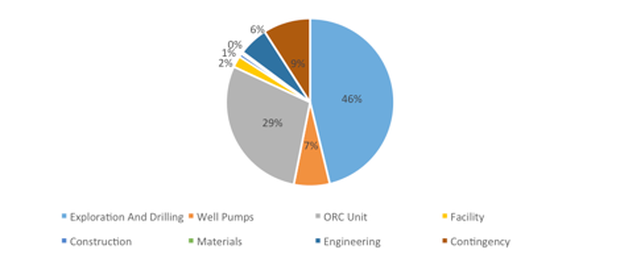|
CanGEA’s chair, Alison Thompson, and Borealis GeoPower’s chief geologist Craig Dunn were interviewed by Alberta’s best-read business magazine “Alberta Venture”. In the interview, Alison Thompson explains what it means when she says that Canada is in the top five producers of geothermal energy in the world - without having a single geothermal power plant. The interview is focused on Alberta but gives valuable insight in general technology transfer possibilites between the oil industry and the geothermal industry. Read "The Volcanic Underground: Is Geothermal Energy The Answer?” right here.
According to Hamish Stewart of the National Observer, "decades of investment and government sponsored research into deep oil sands extraction and Steam Assisted Gravity Drainage (SAG-D) enhanced oil recovery systems could be channelled into the development of a world-leading geothermal energy sector. Rather than continuing as an exporter of raw resources linked to unstable global commodity prices, the province could use its geology and technical prowess to become a global exporter of distributed energy systems and advanced geothermal expertise. As corporate leaders in the oil and gas sector transition their business models away from carbon-intensive assets to renewable energy portfolios, geothermal should be considered in their “2 degree transition plans.”"
Alberta’s Climate Leadership Plan, which describes the phase-out of coal-fired power by 2030, is just the beginning of a transition to a more prosperous, healthy and fiscally responsible future beyond fossil fuel extraction. The full article can be found here. The Board of Directors of CanGEA is proud to announce the selection of Alison Thompson to the Energy Futures Lab Fellowship: a cohort of 40 influencers representing government, NGOs, industry, academia, First Nations and community groups. The Lab is designed and facilitated by The Natural Step Canada in collaboration with Suncor Energy Foundation, the Banff Centre, and Pembina Institute. The Fellows have been brought together to initiate a shift in Alberta towards an energy system characterized by sustainability, resilience, and innovation.
Having held several positions at Suncor, Nexen, and Magma Energy and now as the Managing Director of the Canadian Geothermal Energy Association (CanGEA), Alison has stood on both sides of what sometimes seems like a deep divide between renewable and non-renewable energy production. As an engineer, she understands the technology behind energy production. Through her diversity of experience, she has developed an intimate understanding of the political landscape and business culture of energy in Alberta and beyond. “Energy's not just oil. It’s not just gas. It's not just coal. This province, Alberta, has really redefined energy to mean those three things while the rest of the world, of course, doesn't see energy as only hydrocarbons...” Alison believes that “The EFL opportunity affords the chance for rich and meaningful discussion and evaluation of the energy alternatives. Too often, emerging energy choices have been shut down by an out of context sound byte about the cost of the alternative.” The EFL intention is to forge new relationships between diverse stakeholders from across Alberta’s energy system and through these new relationships develop new solutions. The Fellows have diverse opinions but what they do agree on is to move beyond divisive rhetoric, and towards the energy system that the future requires. To keep up to date with our chair's journey as an EFL fellow, please visit their website. An article, written by CanGEA’s former policy director Justin Crewson, is featured in the October issue of ProcessWest magazine. The article gives a brief introduction to geothermal energy and the technology that is used to harness it. Furthermore, topics like Canada’s extraordinary Hot Sedimentary Aquifer resources, oil and geothermal co-production and existing policy hurdles are touched upon. You can find the article here.
British Columbia’s Ministry of Energy and Mines (MEM) and Oil and Gas Commission (OGC) are considering updating the Geothermal Resources Act for British Columbia. The public consultation phase is open until December 4, 2015. CanGEA invites you to inform yourself about the proposed changes and make your voice heard. Take your part in updating a legal framework that regulates geothermal exploration and development for one of Canada's future geothermal powerhouses. CanGEA is coordinating a response on behalf of the industry. Please provide your comments to us by Nov 27 (E-mails & phone calls are welcome).
The consultation paper can be found here. UPDATE: The CanGEA response can be found here. Chief Geologist, Craig Dunn of Borealis GeoPower speaks to Greenhouse Canada Magazine for their article Energized CropsBeing Fuelled by Alternative Heat Sources. Craig discuss how geothermal is an accessible and affordable method of heating greenhouses to produce local food with a reduced carbon footprint throughout Canada. In particular, the Canadian North could greatly benefit from greenhouses heated by geothermal due to the increased thermal gradient and poor food security. Dunn also mentions the opportunities for waste heat from oil & gas wells.
Read the full article here.
CanGEA's chair, Alison Thompson, was recently interviewed by Bonjour Alberta - a television program that serves the 238,000 plus people that speak French in Alberta. The show speaks first in English and covers the same topics again in French. Alison is joined by Benjamin Thibault from the Pembina Institute to discuss geothermal energy, CanGEA and the economics of geothermal power.
Watch the video below! Our Chair, Alison Thompson, was recently interviewed by CBC radio about the Yukon project CanGEA has been working on. The end result is to have a geothermal resource favourability map produced for the territory as well as a report detailing costs and projects best suited for individual Yukon communities.
The clip is not available online, but the transcript is below. A group representing the geo-thermal industry wants to know more about the energy needs of Yukoners. The Canadian Geothermal Energy Association is mapping geothermal resources in the territory. It's also surveying Yukoners about the priorities in their own communities. Alison Thompson is chair and co-founder of the association. She says the more people who complete the survey the more specific the report can be. "The information that we have can be tailored on a community by community basis and we want to make this as actionable and useful as possible and I don't want every chapter to be the same. I do want communities to have some chosen or indicated preference for us to make it more useful to them." Thompson says the report will estimate the megawatt potential of geothermal in each Yukon community. It'll also include estimates of development costs. Thompson says the report is due in March. Here is the link to the survey: https://www.surveymonkey.com/r/ZJGK5M8 Listen to our chair explain how on ECOReport RadioOn July 25, 2015 CanGEA's chair was featured in a radio interview with the ECOReport. CanGEA discussed the recent comments made by BC Hydro's senior strategic technology specialist, Alex Tu that geothermal cost estimates are "very uncertain" and carry a lot of risk. The comments were made after the release of a geothermal viability study that uses outdated data, including drilling costs from 2012 (the peak of the shale boom) and an decade low foreign exchange rate. As the national industry association for the geothermal industry our primary objective is to advance the industry within Canada, and create opportunities for our member companies in Canada and abroad. With this in mind, CanGEA is working diligently to prepare a submission that refutes BC Hydro's findings and promotes the use of current data that better reflects the actual cost of geothermal projects. This is one example of CanGEA operating to create opportunity for industry growth. In order to continue this work, we consistently need the support of our membership to both fund our operations and empower our industry's voice. You may be thinking: "But I don't work in the geothermal industry" or "I'm not a developer." However, when projects go ahead, everyone in the supply chain benefits. In particular, the world-class oil & gas industry in Western Canada, currently experiencing massive layoffs, is poised to serve as a major player in the geothermal sector. For example, 25 to 30 percent of a geothermal project's budget is made up of drilling costs. With those prices at an all-time low, this significantly cuts a geothermal project's overall budget.
On Friday, July 3rd, CanGEA's chair, Alison Thompson, was part of a panel discussion on Alberta Primetime. Alberta Primetime is a daily program that features current affairs produced by CTV Two. In the piece, Alison identifies the two major barriers to developing geothermal energy in Alberta: public outreach and policy support.
Watch the full video below.
|
|


 RSS Feed
RSS Feed

